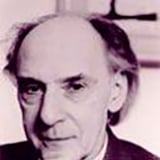Search for topics or resources
Enter your search below and hit enter or click the search icon.

Joseph Horovitz was born in Vienna in 1926 and emigrated to England in 1938. He studied music at New College, Oxford, while acting as an official lecturer in music appreciation to the Forces and giving piano recitals in army camps. After taking his BMus and MA degrees, he studied composition with Gordon Jacob at the Royal College of Music, where he won the Farrar Prize, and for a further year with Nadia Boulanger in Paris.
His first post was as music director of the Bristol Old Vic, where he composed, arranged and conducted the incidental music for two seasons. The Festival of Britain in 1951 brought him to London as conductor of ballet and concerts at the Festival Amphitheatre. He then held positions as conductor to the Ballet Russes, associate director of the Intimate Opera Company, on the music staff at Glyndebourne, and as guest composer at the Tanglewood Festival, USA. He toured extensively in Great Britain and abroad, conducting major London orchestras as well as on the BBC.
In 1959 he won the Commonwealth Medal for Composition and in 1961 a Leverhulme Research Award to work with Philomusica. He has also won two Ivor Novello Awards. Since 1961 he has taught composition and analysis at the Royal College of Music, where he is now a Fellow. From 1969-96 he was an Executive Council Member of the Performing Right Society, and President of CISAC's International Council of Composers and Authors of Music from 1981-89. In 1996 he was awarded the Gold Order of Merit of the City of Vienna, and in 2002 the Nino Rota Prize, Italy.
His compositions number sixteen ballets, nine concertos, two one-act operas inlcuding 'Gentlemen's Island', orchestral works - including Fantasia on a Theme of Couperin (1962) and Sinfonietta for Light Orchestra (1971). He has also written several works for brass band - including the Euphonium Concerto (1972) and Concertino Classico (1985) - and also for wind band.
His chamber music includes five string quartets and the often performed Sonatina (1981) for clarinet and piano and the Music Hall Suite (1964). His best-known choral compositions are Horrortorio (1959), a Hoffnung commission, the award-winning Captain Noah and His Floating Zoo (1970), and Summer Sunday (1975), an ecological cantata and an oratoria 'Samson'.
His activities have extended over a wide range of music, from Son et Lumière productions in England and overseas to scores for theatre, radio, and over seventy TV plays and series.
Topics: